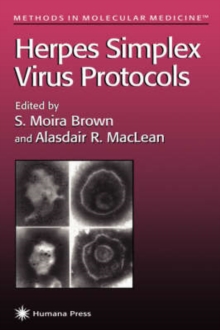
Hepatitis B and D Protocols : Volume 2: Immunology, Model Systems, and Clinical Studies Hardback
Edited by Robert K. Hamatake, Johnson Y. N. Lau
Part of the Methods in Molecular Medicine series
Hardback
Description
Despite the availability of an effective vaccine, there are still 400 million people, worldwide who are chronically infected with hepatitis B virus (HBV).
For them, the vaccine, as currently applied, has no value.
Given the possible consequences of HBV infection, the number of those chronically infected with HBV presents an enormous public health challenge.
For example, the major etiology of hepatocellular carcinoma (HCC) is chronic infection with HBV.
Although fifth in cancer incidence, worldwide, HCC/liver cancer is the third leading cause of cancer death.
The high mortality as- ciated with HCC arises because the disease is often detected late and is unresponsive to treatment.
The number of deaths caused by PHCC is expected to rise over the next 20 years.
Those chronically infected with HBV have a life risk of death to HCC of between 10 and 25%.
Even the limited efficacy of drugs for the treatment of chronic HBV helps underscore the point that this disease is responsive to therapy.
Drugs that target the polymerase (e. g. , hepsera and lamivudine) and interferon alpha represent two distinct strategies and show that both conventional antiviral and immunothe- peutic approaches can be used in management.
However, the current inventory of therapeutics is inadequate.
Interferon alpha is of limited value, only parenterally ava- able, and fraught with adverse reactions.
Information
-
Item not Available
- Format:Hardback
- Pages:572 pages, XXIII, 572 p.
- Publisher:Humana Press Inc.
- Publication Date:28/01/2004
- Category:
- ISBN:9781588291080
Information
-
Item not Available
- Format:Hardback
- Pages:572 pages, XXIII, 572 p.
- Publisher:Humana Press Inc.
- Publication Date:28/01/2004
- Category:
- ISBN:9781588291080










